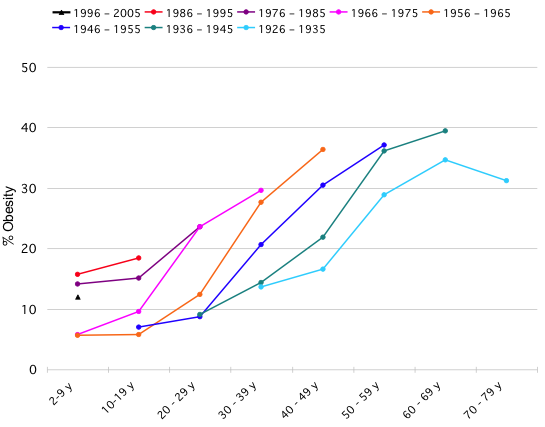This weekend, one of my favorite academic-flavored blogs on the internet shuttered its doors. Effect Measure was a blog about public health and public health policy. The authors, who collectively wrote under the pseudonym "revere" in recognition of Paul Revere's service on the first local Board of Health in the U.S., are expert epidemiologists that brought detailed technical expertise to issues of public health along with a broad knowledge of public health policy and its role on American health. Although I read their blog regularly, their daily -- indeed, sometimes hourly -- analysis of the swine flu outbreak were indispensable and made it a daily read during and after the ...
archives for may 2010
seeing obesity over time
in population healthThe blog Graphic Sociology, part of the Contexts community of
blogs, provides an excellent forum for discussing the
visual presentation of information. The blog's author, Flaneuse(a.k.a., Laura Noren), provides examples of the good, the
bad, and the ugly in data visualization with a narrative of
"what works" and "what needs work" for each graphic.
Yesterday, Flaneuse had a post on obesity trends that originated at the blog Flowing Data. Nathan Yau, the author of Flowing Data posted a challenge to his readers to make an image that answers the question are people getting fatter faster?1 that improves on the following one:

Despite ...
learning from the great one
in work & workflow"You miss 100% of the shots you never take." -- Attributed to Wayne Gretzky
I was reminded of this quote this week after I had a grant submission rejected. Although it stung, the criticisms were legitimate and, as one of my advisors told me, "rejection is part of the process." It was this comment that reminded me of Gretzksy's quote and realizing that, although it doesn't feel good to be rejected, it does mean that I made an effort -- I can't make a shot that I don't take after all.
This was a lesson that was hard to learn in grad school and I was fortunate that I had ...
matching substrings entirely within stata
in methodsAt Orgtheory, Fabio asked about how to identify substrings within text fields in Stata. Although this is a seemingly simple proposal, there is one big problem, as Gabriel Rossman points out: Stata string fields can only hold 244 characters of text. As Fabio desires to use this field to analyze scientific abstracts, then 244 characters is obviously insufficient.
Gabriel Rossman has posted a solution he has called grepmerge that uses the Linux-based program grep to search for strings in files. This is a great solution, but it comes with one large caveat: it cannot be used in a native Windows environment. This is because the grep command ...
